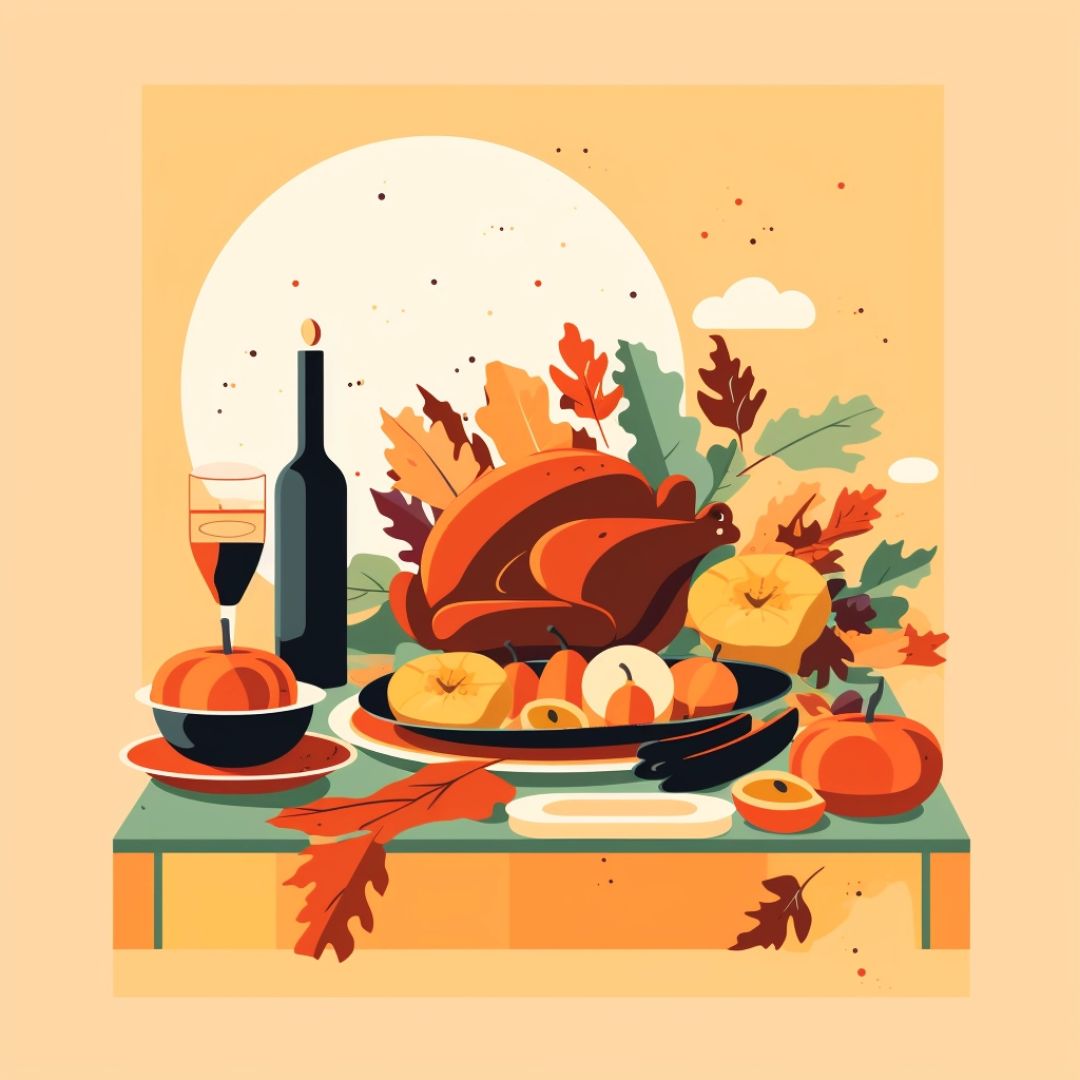Thanksgiving & Mental Health Beyond Turkey & Tradition

The crisp autumn air whispers promises of family, laughter, and overflowing plates. But for many, Thanksgiving paints a different picture. While visions of gravy-stained smiles dance in our heads, anxiety simmers like forgotten stuffing in the oven. Depression casts a long shadow over empty chairs and missed loved ones. Eating disorders tighten their grip as food takes center stage.
Thanksgiving and mental health can be an uneasy dance, the music often drowned out by the clatter of unmet expectations and simmering internal struggles.
This article dives into the complex reality of the holiday, offering a gentle hand and practical tips to navigate both the bounty and the burdens of Thanksgiving while prioritizing your mental well-being. Join us as we explore the challenges, embrace self-compassion, and discover pathways to a mindful and meaningful Thanksgiving experience.
Mental Health Challenges on Thanksgiving
1. Anxiety
For many, Thanksgiving is more than just turkey and mashed potatoes; it’s a pressure cooker of anxiety. The expectation to orchestrate a picture-perfect holiday feast, coupled with worries about family dynamics and social interactions, can send stress levels soaring. Sarah, a college student recovering from anxiety, confesses, “The thought of navigating extended family reunions triggers heart palpitations. Knowing Aunt Mabel always wants to debate politics and Uncle Jim will make insensitive jokes fills me with dread.” This fear of conflict and judgment is a common anxiety trigger during Thanksgiving gatherings.
2. Depression
For those battling depression, Thanksgiving can be a stark reminder of loss, loneliness, and unfulfilled expectations. Empty chairs at the table echo the absence of loved ones, and the cheerful holiday spirit can intensify feelings of isolation. The stark contrast between idealized Thanksgiving portrayals and personal struggles can be particularly painful. As Emily, a young widow, shares, “Seeing families laughing on TV commercials makes me feel even more alone. It’s a constant reminder of what I don’t have.”
| Read the complete article: Thanksgiving and Depression
3. Eating Disorders
For individuals with eating disorders, Thanksgiving becomes a minefield of triggers. The focus on food, the abundance of tempting dishes, and the pressure to eat can exacerbate body image anxieties and disordered eating patterns. “The constant comments about my plate size and second helpings trigger my binge-purge cycle,” admits Michael, a man struggling with bulimia. Finding support and setting boundaries around food are crucial for navigating Thanksgiving with an eating disorder.
4. Other Mental Health Conditions during Thanksgiving
While anxiety, depression, and eating disorders often take center stage, other mental health conditions can also be exacerbated during Thanksgiving. Individuals with substance abuse issues may face heightened temptation due to stress and family conflict. Those with OCD might struggle with disruptions to their regular routines or holiday-related rituals. For PTSD survivors, specific sights, smells, or sounds can trigger painful memories. It’s essential to acknowledge these diverse challenges and emphasize the importance of seeking professional support if needed.
Remembering that you’re not alone is crucial. Many people share your struggles, and resources are available to help you navigate Thanksgiving’s emotional terrain. Whether it’s seeking professional help, confiding in trusted loved ones, or utilizing online support groups, prioritizing your mental well-being is the key to navigating this potentially challenging holiday season.
| Read more: January Blues | Why is January Depressing?
Mental Health Tips for Thanksgiving

1. Manage Expectations: The Perfect Plate Myth
Thanksgiving often comes wrapped in a myth: the myth of the perfect holiday dinner. But chasing this illusion can only lead to stress and disappointment. Let’s ditch the Pinterest-worthy tablescapes and focus on what truly matters: connecting with loved ones and expressing gratitude. Remember, perfection is a mirage, and genuine moments of joy often bloom from the unexpected.
2. Prioritize Self-Care: Fill Your Own Cup First
Before you pour that second glass of wine (or tackle the mountain of dishes), consider filling your own cup first. Self-care during Thanksgiving isn’t selfish; it’s essential for maintaining your mental well-being. Schedule quiet time for relaxation, whether it’s soaking in a warm bath, reading a book, or taking a mindful walk. Don’t neglect healthy eating habits and stay hydrated, fueling your body and mind for the festivities. Remember, a well-rested and nourished you is better equipped to enjoy the day.
| Suggestion: Is Self-Care Selfish?
3. Set Boundaries: It’s Okay to Say “No”
Family gatherings can be wonderful, but they can also bring unwanted obligations and social pressure. This Thanksgiving, remember you have the right to say “no.” Decline additional tasks if your plate is already full. politely excuse yourself from uncomfortable conversations. Setting boundaries isn’t about being rude; it’s about protecting your mental and emotional space. Prioritize your needs and don’t be afraid to create space for yourself when overwhelmed.
4. Focus on Gratitude
Thanksgiving is a natural time to express gratitude, but the true power of this practice lies beyond saying “thank you” for the pumpkin pie. Take time to reflect on the things that bring you joy, big or small. Write down blessings in a gratitude journal, share thankful affirmations with loved ones, or simply pause and appreciate the beauty around you. By shifting your focus to gratitude, you can cultivate a sense of contentment and resilience, even amidst challenges.
5. Stay Active: Move Your Body, Lift Your Spirits
Exercise isn’t just about physical fitness; it’s a powerful tool for mental well-being. During Thanksgiving, don’t let yourself get stuck in a chair all day. Suggest a family walk after dinner, take a solo jog before the feast, or even squeeze in a few quick stretching breaks. Engaging in physical activity can reduce stress, elevate mood, and boost energy levels, making you feel more grounded and positive during the holiday.
| Also read: Mental Health on Valentine’s Day
6. Connect Authentically: Open Your Heart
Thanksgiving gatherings can sometimes feel like staged performances, with predictable conversations and forced smiles. This year, break free from the script and prioritize genuine connection. Ask open-ended questions, listen intently, and share your true feelings, even if they differ from the expected “happy holiday” facade. Authentic connection involves vulnerability and a willingness to be present with another person’s story. By opening your heart, you invite others to do the same, creating a more meaningful and supportive atmosphere.
7. Avoid Triggers: The Safety Valve Technique
For some, certain aspects of Thanksgiving can trigger past traumas or mental health challenges. Maybe it’s family conflict, strong food smells, or overwhelming social settings. This year, empower yourself to identify potential triggers and create a safety valve. Be upfront with trusted loved ones about your needs. Excuse yourself from situations that feel uncomfortable. Take breaks in a quiet space or step outside for fresh air. Remember, prioritizing your mental well-being is never selfish.
| Learn about: Depression in Older Adults
8. Seek Professional Help
Sometimes, self-care strategies and mindful adjustments aren’t enough. If you’re struggling with mental health challenges during Thanksgiving, don’t hesitate to seek professional help. Reaching out to a therapist or counselor can provide invaluable support and guidance. They can help you develop coping mechanisms, navigate difficult family dynamics, and manage anxiety or depression that might exacerbate during the holiday. Remember, prioritizing your mental health is always the best course of action.
9. Celebrate Differently: Reimagine the Feast
Thanksgiving doesn’t have to be confined to a traditional format. If the thought of a large gathering or a stressful feast fills you with dread, explore alternative ways to celebrate. Enjoy a quiet solo Thanksgiving with your favorite comfort food and cozy activities. Gather with a small group of close friends in a casual setting. Volunteer your time at a local shelter or soup kitchen, spreading gratitude through service. Remember, Thanksgiving is an opportunity to express appreciation, and you can do that in ways that truly resonate with you.
10. It’s Okay to Skip Thanksgiving…
Thanksgiving brings expectations, traditions, and sometimes intense emotional pressure. This year, remember that prioritizing your mental well-being comes first. If the thought of participating in Thanksgiving fills you with anxiety, give yourself permission to skip it. Opt for a day of self-care, doing things that bring you peace and joy. Take a solo trip, stay in bed with a good book, or simply enjoy a quiet day at home. Self-compassion is key. Recognize that choosing self-care isn’t about being selfish, it’s about creating the healthy space you need to thrive, even during the holiday season.
Do you think you may experience depression on New Years Eve?
If Yes, the following article is for you:
Manage New Year’s Depression!
How to Spend Thanksgiving Alone

Cozy Up with Comfort
Embrace the hygge vibes! Curl up with a warm blanket, light some candles, and lose yourself in a good book, movie marathon, or your favorite TV show. Indulge in your favorite comfort food, whether it’s a cheesy pizza or a nostalgic family recipe. Don’t forget the hot cocoa or cozy tea to complete the picture.
Connect Virtually with Loved Ones
Distance doesn’t have to mean being alone. Schedule video calls with family and friends to share greetings and Thanksgiving cheer. Play online games together, cook along virtually, or simply enjoy seeing each other’s faces and catching up.
Embrace Creativity and Self-Expression
Spend the day getting creative! Paint, write, play an instrument, or engage in any hobby that brings you joy. Use this time to explore your passions and express yourself freely.
| Use your creativity to fight depression: Art Therapy for Depression
Give Back to Your Community
Volunteering at a local shelter, soup kitchen, or animal shelter is a meaningful way to spend Thanksgiving. Sharing your time and talents with others can bring joy to yourself and those in need.
Pamper Yourself and Relax
Indulge in self-care rituals that make you feel good. Take a long bath, get a massage, or schedule a spa day. Pampering yourself is not selfish, it’s a way to honor your needs and replenish your energy.
Learn Something New
Curiosity is contagious! Use this time to learn a new skill, take an online course, or read a book on a topic that interests you. Expanding your knowledge can be empowering and open up new possibilities.
Disconnect and Reflect
Turn off your phone and social media for the day. This can be a powerful way to quiet the external noise and connect with your inner self. Use this time for meditation, journaling, or simply sitting in silence and reflection.
Enjoy the Unexpected
Remember, a solo Thanksgiving can be full of surprises. Be open to spontaneous adventures, unexpected encounters, and moments of beauty. Embrace the day as it unfolds and enjoy the unique experience.
These are just a few ideas to get you started. Remember, the most important thing is to create a Thanksgiving experience that feels true to yourself and fosters your well-being. What kind of activities resonate most with you for a solo Thanksgiving?
| Uncover: Blue Monday Mental Health
HealWiser’s Last Piece of Advice
Thanksgiving and mental health are intertwined. Anxiety, depression, and other challenges can cast a shadow during the holiday, but so can resilience, self-compassion, and mindful celebration. Don’t be afraid to prioritize your well-being: set boundaries, seek support, and embrace alternative celebrations. Whether you gather with loved ones or enjoy a peaceful solo retreat, let self-care be the centerpiece of your Thanksgiving.
May this Thanksgiving be a season of genuine connection, inner peace, and the courage to nurture the well-being that truly deserves a place at the table.
Sharing your experience can provide valuable insights and emotional support. So…
…share your story with HealWiser and others in the comments section below this post.





